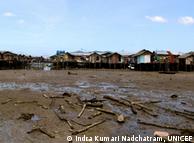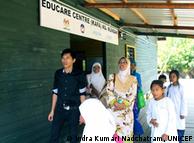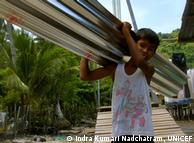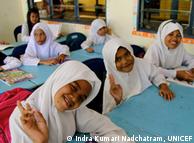Visiting the refugee village of Kampung Numbak, in the Malaysian state of Sabah, is a gut-churning experience. The tin-roofed wooden houses in this fishing community are built on stilts to prevent them from being submerged by water. When the waters recede during low tide, a muddy bed covered in garbage is revealed. Wooden bridges, some with rotten or missing planks, connect the village streets.
At the end of the main road is the Kampung Numbak Education Center. Earlier this year it was opened for some 300 children who previously had been barred from attending school because they lacked the proper papers. The community built the school, with support from the United Nation's Children's Fund, UNICEF, and the participation of the Malaysian government. Officials hope to replicate this model in other communities throughout Sabah.
 Teachers hope to educate children of the Kampung Numbak refugee village"In this school, there are only children that are undocumented. There were parents who wanted to have their children here in this school, which happened to be in the middle of the community, but they were not admitted if they had documents," said UNICEF's representative to Malaysia, Hans Olsen.
Teachers hope to educate children of the Kampung Numbak refugee village"In this school, there are only children that are undocumented. There were parents who wanted to have their children here in this school, which happened to be in the middle of the community, but they were not admitted if they had documents," said UNICEF's representative to Malaysia, Hans Olsen.Kampung Numbak's population of some 8,000 people is a mix of Malay nationals, refugees and undocumented migrant workers, mainly from the Philippines. Malay children can go to government-run schools, Olsen said, where children without birth certificates or other proof of legal residency are not allowed to attend.
"The children that are here had not been to school before. They were left behind when the other children went to the government schools."
No official status
Malaysia has achieved near universal primary education for its children, while tens of thousands of refugee and immigrant children who lack birth certificates have been left behind. They have no official status and are denied the most basic services, including education.
Nearly 2.5 million legal and illegal immigrants, mainly from the Philippines and Indonesia live in Malaysia. Families that fled the Moro Islamic rebellion in the southern Philippines in the 1960s and 1970s are still categorized as "refugees," despite having lived in Malaysia for decades.
 Officials likely underestimate the number of undocumented children out of schoolNur Anuar Muthalib, a UNICEF monitoring and educational officer, says refugee children born in Malaysia with no documents are marginalized - even later in life.
Officials likely underestimate the number of undocumented children out of schoolNur Anuar Muthalib, a UNICEF monitoring and educational officer, says refugee children born in Malaysia with no documents are marginalized - even later in life. "When they grow up, they cannot even open a bank account. They are basically nonexistent in a way."
A 2009 study by the country's ministry of education found nearly 44,000 undocumented children aged seven to 17 not enrolled in school. This figure is believed to be grossly underestimated. Children who do not go to school are easily exploited. Many are prone to child labor. Others wind up on the streets, get into drugs, petty crime and are exposed to abuse.
Anuar says education may not be a panacea, but it can help children avoid many of these pitfalls.
"From our view, children are children. Their place is in school. It is not the children's fault that they are in our country and not able to attend schooling. It is their right," said Anuar.
The teachers here are young, generally inexperienced and poorly paid. But they take their jobs seriously and are committed to helping their pupils learn. One teacher, Amira Binti Asen Abdullah, says she's proud of the progress her students have made in such a short time.
"Before this, the children were just hanging around and playing," she said. "After this, because they have this school, they come here every day and study."
 Activists say education is key to keep children from exploitation"They sometimes come in the evening and study in the library," she added. She said her students very much love to come to school.
Activists say education is key to keep children from exploitation"They sometimes come in the evening and study in the library," she added. She said her students very much love to come to school.And that's not a teacher's wishful thinking. Before coming to this school, 11-year-old Normida says she couldn't read or count. Now, she says, she likes going to school. She especially likes Islamic studies and wants to be a teacher when she grows up.
Azali, who is 13, had never attended school before. He's excited to be in class. He says he's learning a lot and wants to be a soldier.
A model for other communities
UNICEF officials say their aim is to replicate the Kampung Numbak model in other disadvantaged communities in Sabah. They say they have a project ready to go in another refugee village near the city of Sandakhan on the east coast of the island.
Kampung Bahagia, as it is called, bears many similarities to Kampung Numbak. But the school is in a horrible state. The flimsy structure is falling apart, with floorboards missing. The children sit on plastic chairs and have no desks. Classes have as many as 80 pupils. The teachers are few and school supplies and money are short.
UNICEF officials say the new school will accommodate about 1,000 undocumented children. This will be a vast improvement over what currently exists. They note, however, that it will provide no solution for some 2,000 other children in the community who would like to go to school. There's just no room for them.
Author: Lisa Schlein, Sabah, Borneo
Editor: Sarah Steffen
Source : www.dw-world.de

No comments:
Post a Comment